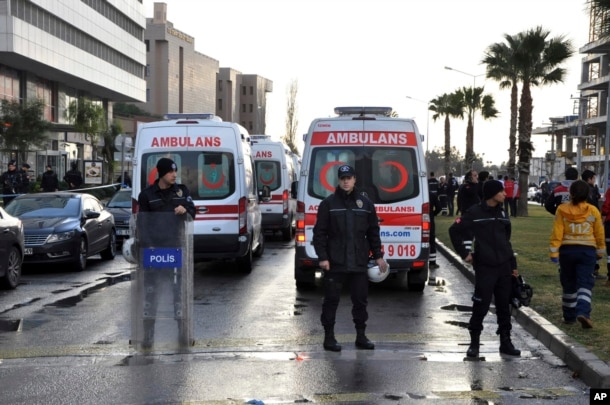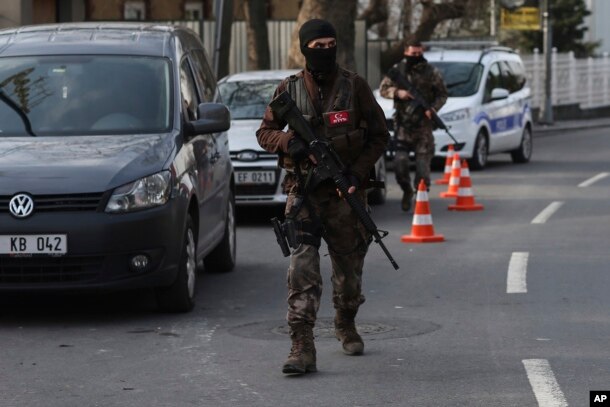Fears of IS Threat Grow in Turkey After Attack

VOA NEWS
ISTANBUL — Rather than uniting Turkey, the so-called Islamic State attack on an Istanbul nightclub, which killed 39 on New Year’s Day, appears to have only deepened societal divisions.
Some social media posts have supported the attack, denigrating the revelers as decadent and anti-Islamic and therefore having gotten what they deserved. One theologian declared the attack was a message that “Turkey is not the old Turkey, and that the pious will bring all others to their knees.”
“There were those who gloated over this attack and who seem to celebrate it, rather than mark the tragedy that happened in front of them,” said Semih Idiz, a political columnist for the website Al-Monitor. “This all goes back to this post-modern civil war that has been going on between Islamists and secularists, between the ultra-conservative nationalists and the more pro-European elements.»
Idiz also cast blame on official Ankara. “We have a government that hasn’t really helped in overcoming divisions,» he said. «In fact, at times the approach of the government and the president is divisive rather than unifying.“
The atmosphere before the nightclub shooting was widely seen as toxic, with pro-government media slamming New Year’s Eve celebrations as anti-Muslim. That stance was backed by the state-appointed head of Turkey’s powerful Religious Affairs Directorate, which administers the Islamic faith.

Security members and ambulances attend the explosion site in the Aegean city of Izmir, Turkey, Jan. 5, 2017.
Still, President Recep Tayyip Erdogan pushed back against critics. “Nobody’s lifestyle is under systematic threat in Turkey,» he said. «We will never allow this. Those who claim this have to prove it. It is my duty to protect everyone’s rights.”
Officials say steps are being taken against «divisive» social media posts. But, to date, the only person detained was a women in Istanbul who appeared in a viral video calling on people to fight for secularism and stand up against Islamic State.
The New Year’s attack has put a spotlight on government policy toward Islamic State and other jihadist groups.
“Turkey did choose to support Islamist-leaning members of the Syrian opposition with the expectation that the support would accelerate regime change in Syria,” said Sinan Ulgen, a visiting scholar at Carnegie Europe in Brussels. “But we’ve discovered that these groups in the meantime [have] taken advantage of this position of the Turkish government, by establishing their own network and structures within Turkey, and they are using this to orchestrate terror attacks against Turkey.“
President Erdogan has rejected charges that his government has failed to crack down on IS. «No one in the world fights Islamic State more than Turkey,” he said following the New Year’s attack.

Turkish special security force members patrol near the scene of the Reina night club following the New Year’s day attack, in Istanbul, Jan. 4, 2017.
Turkish authorities suspect the gunman, who is still at large, was a foreigner, a member of the Uighur Muslim minority. However, fears are growing about the domestic threat posed by Islamic State.
“There is a strong power base within Turkish society; millions share their ideology,” said Haldun Solmazturk, head of the 21st Century Turkey Institute, an Ankara-based think tank. “Some polls – for example, one run by the Pew research institution of the United States – indicate about 8 percent of Turkish society is sympathetic to [Islamic State’s cause]. This would make up about six million Turkish people. And I see how radical certain groups within Turkish society are becoming. I watch it in day-to-day business, watching TV stations, listening to radio; it’s all around.”
The government has promised to crack down on Islamic State within the country, and dozens of people have been detained. Ulgen says the crackdown is flawed.
“Turkey does have experience in articulating and implementing counter-terrorist strategies,» he said. «But where it has not really led or displayed a lot of progress is on the accompanying aspect of counter-radicalization. And the experience of many other countries in the world that are trying to stave off the threat of Islamic extremism is that these two strategies need to go hand in hand.».
Despite the Istanbul nightclub attack, Ankara’s priorities remain in question.
“The real public enemy for the Turks and the government at the moment is the PKK (Kurdish rebel group) and any group related (to) the PKK,” said Idiz. “And you will find a significant disparity between those arrested for PKK crimes and those arrested for ISIS-related crimes, and that on its own speaks volumes about the situation.”
With the Turkish military stepping up its campaign against Islamic State in Syria and jihadists calling on their Turkish supporters to stage attacks, Ankara could be in a race against time.

